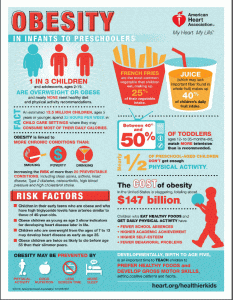“We’ve blamed the individual for so long and we have to start seeing that it’s not working. It’s not the individual’s fault. It is our entire environment and we’re not going to see changes in health until we go out in the community and create change” (The Food Deserts of Memphis: Inside America’s Hunger Capital, 00:11:18-00:11:33)
According to data published by the Centers for Disease Control and Prevention, childhood obesity is a serious problem in the United States. Obesity prevalence among children and adolescents is still exceptionally high for those between the ages of 2-19 years old. And as expected childhood obesity is more common among certain populations. For instance, Hispanic and non-Hispanic Black children have higher obesity prevalence than non-Hispanic White children (Centers for Disease Control and Prevention). However, as the quote points out causes for the large increase in childhood obesity and obesity in general throughout the years goes so much deeper than what people chose to eat. In fact the majority of childhood obesity can be blamed on the lack of fresh and nutritious produce low-income communities of color have access to. 
Often times fast food restaurants like McDonalds and Wendy’s are far closer to residents than grocery stores, while offer more food for less the price. As author, activist, and farmer Will Allen put it “in inner-city communities throughout the United States, it is easier-and often less expensive- to buy a Twinkie or frosted cupcakes or a box of fried chicken than fresh vegetables or fruit” (Allen, 7). Therefore, it is no surprise that the rate of obesity has skyrocketed.
While the city of Brockton has fifteen food pantries many of the residents are unaware of their locations, hour of operation, or their existence. Leaving hundreds of residents with no healthy or affordable alternatives. Therefore, in order to insure that residents have access to as many resources as possible, as well as understanding the undue burden placed on them education is key. By incorporating food education within public school curriculums children will be able to understand the importance of a balanced diet. It is also more likely for parents to get involved within the program if their children are required to bring homework home. The reason we believe so strongly in educating for both the children and their parents, is due to the fact that without the proper knowledge these residents are unable to fully advocate for themselves and their right to healthy foods.